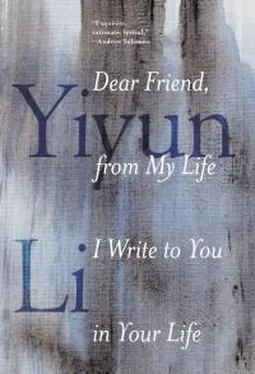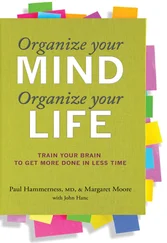That this character has left Beijing does not change the fact that there is a space for her there. She may refuse to occupy it but it cannot be filled by others. The rowboat on the lake of the Summer Palace, which she could have rented for an afternoon, will stay idle, the oars unhooked from their hinges. Her local postman, the green canvas bag attached to the crossbar of his bicycle, will balance himself with a leg on the curb while sorting the mail, though she will not be there to chat with him. At a class reunion an old, one-inch school picture will be scanned and enlarged because she does not wish to attend or send a current photo to absolve her absence.
Why will you not acknowledge you could be that person—I can hear my friend question me—in fact, you are that person? The answer, I think, is that I do not want a self watching itself and contemplating alternatives. One risks losing one’s privacy in fiction, and to be anti-autobiographical lessens that danger. I cannot possibly be any one of my characters; they have alternatives that I do not. And yet I don’t mind experiencing their loss of alternatives alongside them. One lives more feelingly in a borrowed life.
Do you not worry about losing your privacy in these essays? again I hear my friend question, but the truth is, the privacy I cling to has little to do with others. Once I saw a preschooler, my son’s playmate, demonstrate that skill. He was bothered by a small disaster and, without complaining or crying, he made his body still; his eyes, grayish blue, became lifeless. I had never witnessed so closely a mind switched off by will. It took a few seconds—not long, though a gap nevertheless—for his eyes to turn from panic into glassiness, behind which I could sense that unwavering determination for absence. Practitioners of that vanishing act develop the belief—illusion, really—that one can exist unobserved.
—
ONE CANNOT BE an adept writer of one’s life; nor can one be a discerning reader of that tale. Not equipped with a novelist’s tools to create plots and maneuver pacing, to speak omnisciently or abandon an inconvenient point of view, to adjust time’s linearity and splice the less connected moments, the most interesting people among us, I often suspect, are flatter than the flattest character in a novel. Not only do we not have any alternatives, we discredit them. It has to be so— this indisputable conviction is often at the foundation of our decisions, including the most impulsive or the most catastrophic. It is easier to be certain of one thing than to be uncertain of a hundred; easier for there to be one is than many might have beens.
You should be very careful every day for the rest of your life, a doctor told me. Why? I asked. (I could not help but think how bad that line was— every day for the rest of your life. Such absoluteness. In fiction a character should never be allowed to speak the line.) Things could sneak up on you, the doctor said; when you realize it you’d have already lost the solid ground underneath you. What do I do? I asked. The doctor answered that I should never go off medication. I understood it as there is nothing I can do.
Does it have to be so? I often wonder.
These essays were started with mixed feelings and contradictory motives. I wanted to argue against suicide as much as for it, which is to say I wanted to keep the option of suicide and I wanted it to be forever taken away from me. Writing this book has taken about two years now, as long as the period that led to it, a year of descending into the darkest despair and a year of being confined by that despair. The bleakness, which can be summarized with a few generic words—suicide attempts and hospitalizations—was so absolute that it sheds little light on things. A sensible goal is to avoid it.
I have learned, during these past few years, that a small misstep can lead to an unraveling, in a matter of hours, sometimes minutes. Wisdom or mental strength is not what is lacking when this happens. To acknowledge that it is not a failure does not mitigate the grief. The difficult moment is not when one gives up—giving up, in fact, brings certainty; relief and peace, too—but afterward, when the same pattern repeats itself. Why, one asks again and again and again, but to question is to confront the unchangeable. One can only accept that cell signaling works faster and in a less regulated manner than logic. Those few seconds before the boy’s eyes turned dim: that gap between clarity and confusion is where a mind, with the instinct of self-preservation, battles against itself. That gap is my privacy. Writing fiction has been my way to protect it, though not always effectively. Writing from the gap—this book—is an experiment in establishing a truce with what cannot be changed.
Many drafts were written when things began to feel unbearable. Composing a sentence is better than composing none; an hour taken away from treacherous rumination is an hour gained; following the thread of a thought to the end is better than having many thoughts entangled. In a sense, writing becomes the effort of detecting a warning sign before it appears. There are moments when it must sound as though I am arguing against hope and happiness, against others and myself, but any attachment, even to the most fallacious idea, is an anchor when solidness cannot be felt.
—
THE PARAGRAPHS IN Montaigne’s essays all bear a letter (A, B, or C) to indicate the different time points when he composed them—he often returned to work on the same essays. Without these markers, a reader “may write him off as irresponsibly inconsistent,” explains his translator Donald Frame, as the essays “are intended to be a record of change.”
It would be presumptuous to mark my essays similarly, though the two years spent writing them have been full of ambiguities. Sentences and paragraphs were written and rewritten under different circumstances, arguments reframed, thoughts revised; most of these essays took a year or longer to write. Coherence and consistency are not what I have been striving for.
There is no ladder out of any world; each world is rimless —my friend Amy Leach writes. A ladder is no longer what I am seeking. Rather, I want one day to be able to say to myself: Dear friend, we have waited this out.
A Partial List of Books
Persuasion, Jane Austen
Sense and Sensibility, Jane Austen
The Death of the Heart, Elizabeth Bowen
To the North, Elizabeth Bowen
People, Places, Things: Essays by Elizabeth Bowen, ed. Allan Hepburn
Elizabeth Bowen, Victoria Glendinning
Selected Stories of Anton Chekhov, trans. Richard Pevear and Larissa Volokhonsky
A Life in Letters, Anton Chekhov, ed. Rosamund Bartlett, trans. Rosamund Bartlett and Anthony Phillips
Autobiography of Maxim Gorky: My Childhood, In the World, My Universities, trans. Isidor Schneider
Monsignor Quixote, Graham Greene
Ways of Escape: An Autobiography, Graham Greene
Jude the Obscure, Thomas Hardy
Life’s Little Ironies, Thomas Hardy
The Mayor of Casterbridge, Thomas Hardy
Tess of the D’Urbervilles, Thomas Hardy
Letters of Emma and Florence Hardy, ed. Michael Millgate
Ernest Hemingway: Selected Letters 1917–1961, ed. Carlos Baker
Either/Or: A Fragment of Life, Søren Kierkegaard
Letters to Monica, Philip Larkin, ed. Anthony Thwaite
Stories, Katherine Mansfield
The Katherine Mansfield Notebooks, ed. Margaret Scott
Katherine Mansfield: Selected Letters, ed. Vincent O’Sullivan
All Will Be Well: A Memoir, John McGahern
Читать дальше












